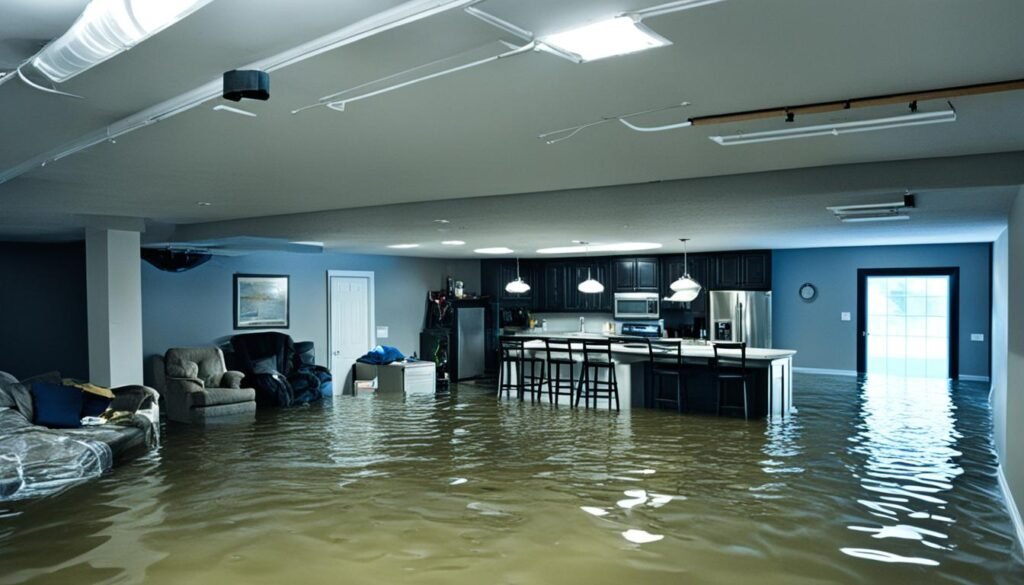Did you know water damage is the second most filed home insurance claim in the U.S.? Every year, water damage from burst pipes, broken appliances, or storms affects millions of homes. Being ready is key to reducing harm to your home and stuff.
Key Takeaways:
- Water damage emergencies can occur due to various reasons, including burst pipes and natural disasters.
- Being prepared for water damage emergencies includes understanding the risks, having proper insurance coverage, and creating an emergency plan.
- Regular maintenance and installing backup systems can help prevent and mitigate water damage.
- Prompt action and following the proper steps for assessment, safety, water extraction, drying, cleaning, and restoration are crucial in mitigating the damage.
- Reviewing your insurance policy to understand what is covered for water damage is important.
Steps for Dealing with Water Damage
When water damage happens, acting fast and following the right steps are key. This will help prevent more damage and ensure a quicker fix. Let’s go over the main steps to tackle water damage:
- Locate the source and stop the water: The first thing to do is find where the water is coming from. Then, stop it from getting into your property. You might need to shut off your water supply, repair a leaky pipe, or fix other water entry issues.
- Turn off the power: For safety, especially if water has reached electrical outlets or appliances, turn off your home’s power at the main electrical panel.
- Contact your insurance company: Get in touch with your insurance company quickly to tell them about the water damage. They will help you through the steps and paperwork needed for a quick response.
- Remove wet items and start drying: Immediately remove wet items like furniture, carpets, and personal items from the water-affected area. Begin drying the area with fans, dehumidifiers, and towels to soak up the moisture.
- Seek professional assistance: If the water damage is extensive or you’re not sure how to handle it, call a professional water damage restoration service. They have the skills and tools needed to thoroughly remove water and dry your property, preventing more damage or mold.
- Inspect for mold growth: Water damage can lead to mold. If you think there might be mold, call a mold specialist to check. It’s important to deal with any mold quickly to keep your home safe and prevent more damage.
- Clean and sanitize: Once the area is dry and mold issues are handled, clean and sanitize it. This means using the right cleaners to get rid of germs, bacteria, and any smells.
- Restore and rebuild: Depending on how bad the damage is, you may need to fix or rebuild parts of your home. This can include walls, ceilings, floors, or other parts damaged by water.
- Prevent future water damage: To stop water damage from happening again, make sure to keep your home in good shape. This includes checking drains, maintaining appliances and pipes, and installing leak detectors.
Remember, dealing with water damage quickly and effectively is crucial. By taking quick action and following these steps, you can protect your property from more damage.
Quick Water Damage Solutions
| Solution | Description |
|---|---|
| Locate the source and stop it | Find the water damage source, like leaks or burst pipes, and act fast to stop the water. This helps prevent more damage. |
| Turn off power | Make sure to turn off the electricity to stay safe and avoid electrical dangers. |
| Remove wet items | Quickly get rid of wet items from the area to stop more damage and help the drying process. |
| Start drying | Use fans, dehumidifiers, and towels to dry the area and keep mold from growing. |
| Seek professional help | If the damage is too much or you can’t handle it, call a water damage restoration expert. |
https://www.youtube.com/watch?v=MwtwRXBlZPo
Conclusion
Dealing with water damage emergencies can feel like a huge task. But, quick action and being prepared can reduce their effect. Know the risks, have good insurance, and make a plan to tackle water damage emergencies.
Here are the steps to handle water damage. First, find where the water is coming from. Then, cut off the power for safety. Next, call your insurance company, remove wet items, and start drying out. You might also need to repair damaged areas.
To avoid future water damage, be proactive. Work on improving your property’s drainage. Regularly check and maintain your home. Take steps to prevent water damage before it happens.
By being prepared and following these tips, you can quickly deal with water damage. Protect your home, keep your family safe, and reduce the risk of damage. Act fast, call in experts if you need to, and take steps to prevent future issues. Stay informed and ready to act to keep your home safe.
FAQ
How can I handle water damage emergencies?
What should I do if I experience water damage at home?
How can I prevent water damage disasters?
Source Links
- https://www.ghp1.com/blog/five-steps-to-handle-commercial-water-damage-emergencies
- https://www.puroclean.com/zephyrhills-fl-puroclean-certified-restoration-specialists/blog/emergency-water-damage-restoration-preparedness-comprehensive-guide-homeowners/
- https://www.forbes.com/home-improvement/home-emergencies/steps-after-water-damage/


